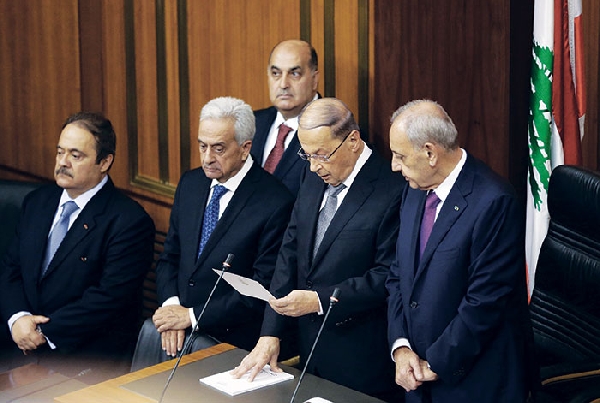
|
| Aoun taking the oath of office. |
DEARBORN — In the old country, it seemed like every home was empty as gunfire and fireworks roared across Lebanon, breaking a dragged and suspenseful lull among the country’s streets. Across the nation on Monday, a politically divided people celebrated the election of General Michel Aoun as Lebanon’s 13th president, ending a two-and-a-half-year political vacuum.
Orange, blue, yellow and green flags representing various political parties waved above high-spirited crowds. Lebanon finally had a president.
Lebanese Americans looked beyond the U.S. presidential election to pay a tribute to progress and hope in their homeland – even if half-heatedly.
Most view filling the vacancy as a right step toward improved services and bureaucracy in Lebanon, but said the parliament’s struggle between various factions will continue to gridlock long-term solutions.
Ali Jawad, founder of Leaders Advancing and Helping Communities (formerly the Lebanese American Heritage Club), said he hopes the Lebanese government’s ability to reach a consensus on a leader will be an opportunity to streamline state operations and ensure stability in a country surrounded by afflicted neighbors.
Jawad is also concerned about unabashed corruption among government officials, but said Aoun, now at the helm of authority, could be the one to incrementally lead a movement toward honest politics, push for more stable electricity to homes and offer a solution to the garbage crisis.
Despite divisions and strife in the Middle East, Jawad urged the local community to exemplify Lebanon unity.
As the Lebanese diaspora have high hopes for Lebanon’s future, most are doubtful the newly elected president could put an end to corruption and bickering.
Ali Yassine, a local school administrator, looks favorably upon the parliament’s required two-thirds vote to elect a president. However, he said he believes the results were predetermined by foreign powers who have an interest positioning Aoun as president.
Aoun, who forged an alliance with Hezbollah after returning from his 15-year-exile in Paris, is seen as a prime pick for the Shi’a faction’s backer, Iran.
With the blessing of Saudi Arabian officials, former Lebanese Prime Minister Saad Hariri, head of the Future Movement, returned to the job on Thursday – a win for the Sunni partners.
Iranian politicians hailed Aoun’s election as a victory.
“Iran is ready to expand diplomatic, economic and cultural ties with Lebanon,” President Hassan Rouhani told Aoun over the phone.
Yassine, who called Aoun a capable and experienced president, said he is happy and foresees a more stable Lebanon, but is concerned that for average citizens in the unsettled country, life will be the same.
A yearn for government reform and improved services are widely felt, but for many who celebrated, Aoun is the man to introduce gradual change.
Representing Aoun’s party in the U.S., Salim Sessine is one of those who have faith that the new president is capable of reversing decades of nepotism and sectarian-based governance.
Sessine, vice president of the Lebanese American Council for Democracy, said for the past 25 years, Lebanese politicians have worked to secure government as an exclusive club.
Amid the “Yalla Irhal” (Yalla, leave) and “You Stink” campaigns in Lebanon directed toward inept politicians, Sessine said Aoun will push to return the government to work for the interest of a largely frustrated people.
“Lebanon is like having a large tree in your backyard,” Sessine said of reform. “Over the past 25 years, it has become a deeply rooted tree with a lot of big branches. The way it’s going to start working is by slowly cutting down the branches before you pull out the tree’s trunk.”
With long-standing ministers and current support in parliament, Sessine added that Aoun, with whom he has had multiple conversations, said delivering results is a priority.
He said Aoun is aware of the Lebanese immigrant community’s impact on spreading the nation’s message to U.S. politicians and organizations.
Regardless of differences, Sessine said he received floods of congratulations from dozens, including from local opposing party organizations.
However, not all Lebanese Americans are optimistic about the homeland’s future.
Shadi Saad, a local pharmacist, said he has some concerns about Aoun’s fitness for the presidency and thinks his election was an aim for availability.
Saad pointed to Aoun’s age and the prospect of mental decline during his final years in his position.
“He doesn’t have the mental capabilities to run the country,” he said. “He is 83 years old, for God’s sake.”
Aoun’s term lasts for six years.
The president’s supporters have vowed that he will press for an end to corruption, but Saad refuted that possibility, as evidenced by the appointment of his son-in-law, Jebran Bassil, as foreign minister and as the leader of the Free Patriotic Movement.
Aoun’s favoring his relatives is a testament to nepotism and corruption, he added.
Saad also pointed to the then-general’s bombing of parts of Beirut in 1989, during the Lebanese Civil War, when he was a contested prime minister.
Nonetheless, the presidency does reveal positive signs for the country’s system, he added.
Saad said as the country has always struggled with controlling its own government without foreign interference, Aoun’s election might finally provide a chance for political sovereignty in Lebanon.
Despite political differences and the upcoming U.S. elections, many Lebanese Americans are proud to call Aoun their homeland’s leader.
However, some Arab Americans who spoke to The AANews see honoring the new president as a sectarian reaction, not based on the county’s interests.
To them, President Aoun is better than having none.
The politicians behind the wheel might remain the same, but Aoun could play a positive role in the well-being of the Lebanese government’s administration and bureaucracy.
Only the next six years can tell.






Leave a Reply